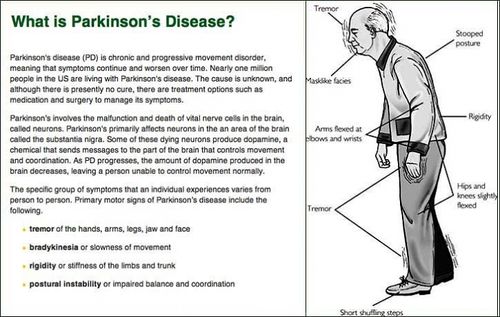Parkinson's
Introduction
Parkinson’s Disease (PD) is a neurogenic disorder associated primarily with motor dysfunctions such as bradykinesia, awkward gait, and postural instability, and, more recently, with several psychological or neurological states. Major Depressive Disorder commonly presents as a comorbidity with PD, and cognitive dysfunctions, particularly in cortical areas pertaining to executive functions such as judgement and planning, are also frequent, and in need of further research. Fortunately, recent scientific investigations into these and other detrimental effects of PD have resulted in several discoveries that could set the foundations for novel treatments to increase quality of life for individuals afflicted by this progressive, incurable, degenerative illness.

By [Name]
At right is a sample image insertion. It works for any image uploaded anywhere to MicrobeWiki. The insertion code consists of:
Double brackets: [[
Filename: Ebola_virus2.jpg
Thumbnail status: |thumb|
Pixel size: |300px|
Placement on page: |right|
Legend/credit: Electron micrograph of the Ebola Zaire virus. This was the first photo ever taken of the virus, on 10/13/1976. By Dr. F.A. Murphy, now at U.C. Davis, then at the CDC.
Closed double brackets: ]]
Other examples:
Bold
Italic
Subscript: H2O
Superscript: Fe3+
Introduce the topic of your paper. State your health service question, and explain the biomedical issues.
Section 1
The term “punding” refers to purposeless, often repetitive behaviors such as lip smacking, hand shaking, or finger waggling. Contrary to common belief, punding, present in about 5.4% of patients diagnosed with PD, is most frequently a side effect of medications received for PD, and not of the disease itself. While punding itself may not cause critical medical problems, it is considered an indicator of later-stage PD, and, depending on level of severity, it may substantially decrease a patient’s quality of life.
Recently, a study published in July 2015 showed punding behaviors to relate positively to high levels of L-DOPA drug therapy, presentation of dyskinesia, and Impulse Control Disorder (ICD.) The study also assessed regions of cortical degeneration in PD patients, finding high levels of thinning in prefrontal brain regions. These results supported other findings that PD-diagnosed individuals are less effective in performing executive functions such as planning, or decision-making.
Section 2
Include some current research, with at least one figure showing data.
Section 3
Include some current research, with at least one figure showing data.
Conclusion
References
Authored for BIOL 291.00 Health Service and Biomedical Analysis, taught by Joan Slonczewski, 2016, Kenyon College.
